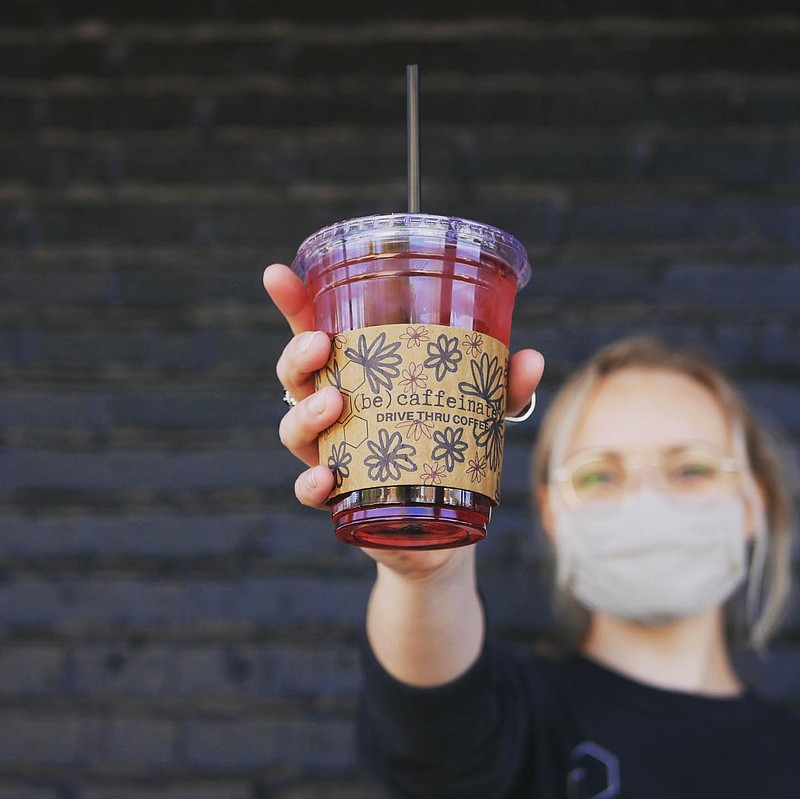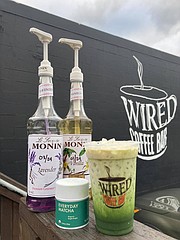Coffee and tea are essential. They are the focal point of many family gatherings, late night study sessions, board meetings and chats with friends - and the drinks are constantly evolving.
Seasonal drinks are still in vogue. Chris Wood, owner of Red Bank's Be Caffeinated, says "anything with pumpkin in it is super popular." That holds true as the seasons continue to change - people will move from pumpkin to marshmallow to gingerbread.
But another trend has been on the rise recently: curiosity.
Last year alone saw a boom in coffee and tea trends, and customers are getting more experimental. From dalgona, or whipped coffees, to milk alternatives and flavored matcha drinks, caffeine-lovers are getting curious and creative with how they consume, eager to try new things.
Amber Forgani, owner and manager of Culture Coffee Co. - which is known for its turkish coffee in downtown Chattanooga - has noticed the rise in plant-based milk alternatives in particular.
"Oat milk is the new milk alternative," she declares, going on to explain that oat milk is the most similar to its bovine-derived counterpart in terms of consistency and taste. Lisa Goolsby, owner of Wired Coffee Bar in Ooltewah, concurs, explaining that, in comparison to other alternatives such as almond or soy milk, "oat milk is the best for steaming."
Forgani also notes that recent health-based trends like adding supplements such as collagen powder and MCT (medium-chain triglycerides) oil or butter have been popular. We all know collagen has anti-aging properties, but it also can be added in powdered form and small amounts to coffee for a protein boost. MCT oil and butter, on the other hand, "allow the coffee to bind to the fat [in the butter and oil]," says Forgani, "help[ing] to aid digestion." This, she says, leads to a smoother, less jittery caffeine experience.
She and Goolsby also mention sugar substitutes like Splenda or stevia being fairly popular. And Wood has seen similar trends - his customers are tending to want their drinks only half sweetened, or with only half the regular amount of pumps of syrup.
Not only are customers getting more experimental, though, they're getting more technical and knowledgeable, too.
Goolsby has also seen her customers inquire more about the freshness and harvesting process of their coffee. They tend to request ceramic mugs rather than the usual paper cup (there is a taste difference between the two.) All of this signifies a consumer concern not just about how coffee tastes and the additives put in it, but how it is sourced, made and presented.
"Our coffee's grown in family farms, we know where that coffee comes fromand our customers want to know that," Goolsby says. Customers are also curious about the extraction processes for coffee. Pour overs and French presses, for example, lead to a better overall flavor and freshness of coffee, and consumers like being able to try that and taste the difference between the processes.
As for what's next in the world of coffee and tea, Goolsby suggests looking towards the East and West coasts where trends tend to pop up before traveling inland.
"You never know what they'll come up with next," says Forgani.
What's in your cup?
Matcha. Derived from green tea leaves, matcha is a powdered coffee alternative that provides slightly less milligrams of caffeine in comparison to your average cup of coffee. It also has plenty of antioxidants. Pour over. This is a method of brewing in which a coffee filter and grounds are placed directly on top of a cup, and then hot water is poured over the grounds, allowing the coffee to filter through and slowly drip into the cup. French press. This method of brewing places coffee grounds and hot water into a coffee press. Then the grounds are plunged to extract oils and flavonoids. Turkish coffee. Strong, unfiltered brew made of finely ground beans, prepared and served in a small beaker known as a "cezve." Stevia. Derived from the stevia plant, this sugar substitute is great for those looking to cut back on sugar intake. MCT oil or butter. MCT, or medium-chain triglyceride, is a superfood that has been linked to metabolism. Its oil derivative, when combined with grass-fed butter, is said to help the body more slowly digest coffee, leading to a smoother, calmer caffeine experience, rather than having the typical high and then crash afterwards. Collagen. In its powdered form, this beauty product is said to be a good protein supplement additive to coffee. Cold brew. Coffee made by steeping grounds in room temperature or cold water for an extended amount of time, leading to a different flavor profile, and amount of caffeine, than traditional brewing. Nitro cold brew. A variation of the cold brew, the addition of nitrogen gas creates a smooth texture for the coffee. Dalgona coffee. Also known as whipped coffee, this is a beverage made by whipping equal parts instant coffee, sugar and hot water until it becomes creamy, then adding it to cold or hot milk; the result is something that looks less like a morning brew and more like a dessert.

